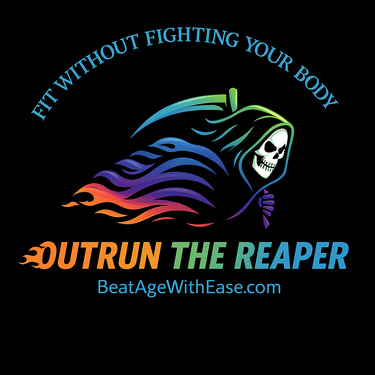Exercise Snacks for Longevity: How 5-Minute Bursts Might Add Years to Your Life
New research shows short bursts of exercise — “movement snacks” — can boost longevity and heart health after 60. Here’s how to use 5-minute workouts to age well.
Bruce R Black
10/27/20254 min read


Exercise Snacks for Longevity: How 5-Minute Bursts Might Add Years to Your Life
If you’ve ever thought, “I don’t have time to work out,” congratulations — science just handed you your excuse… and then politely took it away.
Because it turns out, you don’t need long workouts to live longer. You just need little ones — lots of them.
They’re called exercise snacks — short, powerful bursts of movement (as little as 1–5 minutes) that get your heart rate up, your muscles firing, and your mitochondria singing hallelujah. And new research suggests these mini-sessions could pack serious anti-aging benefits, especially for older adults.
So grab your shoes, your sense of humor, and maybe your rebounder — we’re going snacking.
🧠 The Science Behind “Exercise Snacks”
A new review in the British Journal of Sports Medicine (2025) and several supporting studies show that brief bouts of vigorous movement — even if scattered through the day — can significantly improve cardiovascular and metabolic health in adults over 60.
👉 Prevention article on the study
Researchers found that:
Just 3 to 5 minutes of high-effort movement (think brisk walking, stair climbing, or jumping jacks) increases blood flow and oxygen delivery.
These “micro-workouts” can improve VO₂ max, one of the strongest predictors of longevity.
Older adults who performed short, daily movement bursts reduced their risk of cardiovascular disease and early mortality — without committing to long gym sessions.
Another 2023 Nature Medicine study using wearable trackers found that three 1-minute bursts of vigorous activity per day — totaling under 5 minutes — lowered mortality risk by nearly 40% in older adults who weren’t otherwise “exercisers.”
👉 Nature Medicine summary
Translation? You don’t need a treadmill. You just need to move fast, often, and joyfully.
💪 Why Short Bursts Work So Well
Think of your body like a hybrid car.
When you sit all day, it idles in low-efficiency mode. But when you add frequent movement bursts — short, powerful accelerations — everything turns on:
Your metabolism ignites (you burn more even at rest).
Your heart and lungs expand capacity.
Your muscles stay “awake”, signaling your nervous system that you’re still in the game.
Your brain gets flooded with BDNF (Brain-Derived Neurotrophic Factor) — the miracle fertilizer for neurons that helps protect memory and learning.
The real secret? Consistency trumps duration.
You can spend 45 minutes on a treadmill twice a week… or 5 minutes of joyful motion several times a day — and your body will often prefer the latter.
⚙️ How to Build Your “Snack Routine”
1. Start with the rule of 3×3
Do three “snack” sessions per day, around 3 minutes each.
Morning, midday, and evening — that’s it.
Each snack should make you breathe a little heavier but still allow you to talk.
(If you can sing Beyoncé mid-snack, you’re going too easy. If you can’t talk at all, slow down.)
2. Rotate your snack types
Keep your body guessing — and your mind from boredom.
Here are categories to mix and match:
3. Stack snacks like meals
Think of your day as a tapas bar of motion.
Before coffee: 2 minutes of squats or wall pushups
After lunch: 3-minute brisk walk
Evening: 5-minute rebounder bounce session
That’s 10 minutes total — enough to influence your blood sugar, circulation, and brain chemistry.
🦶 The Rebounding Snack (A Beat Age With Ease Favorite)
Let’s give the spotlight to one of our go-to movement heroes: rebounding.
It’s not just fun — it’s science-backed. Studies show that gentle bouncing on a mini-trampoline can:
Improve lymphatic drainage, helping your body clear waste and boost immunity
Strengthen bones and joints with minimal impact
Enhance balance and coordination, especially in older adults
Increase VO₂ max and circulation, rivaling brisk walking or cycling
Even NASA used rebounding in astronaut recovery because it stimulates every cell without pounding your joints.
Try this 5-minute rebounding snack routine:
1 minute of gentle bounce (feet stay in contact)
1 minute alternating high knees
1 minute wide stance squats
1 minute side-to-side twists
1 minute bounce + smile — that part’s mandatory
Bonus: rebounding doubles as cardio and lymphatic massage. You finish energized, not exhausted.
🧍♀️ Snack Ideas for Every Energy Level
Because not all days (or knees) are created equal.
🔹 Low Energy Days
Shoulder rolls + seated marches (3 min)
Standing side bends + deep breathing
Slow rebounding or gentle dance
🔹 Medium Energy Days
Stair intervals (walk up and down for 2 min)
Bodyweight squats + wall pushups
20 jumping jacks every hour
🔹 High Energy Days
Brisk walking “sprints” (walk fast 1 min, slow 1 min × 3)
Rebounding or jump rope
Mini-circuit: squats + planks + power walk
Remember: the best workout is the one you’ll actually do again tomorrow.
🧬 The Longevity Link
Let’s connect this to the bigger picture.
Every snack you take (of movement, not cookies) triggers micro-signals in your body that say:
“Hey, I’m still hunting, building, and exploring. Don’t slow down.”
That message does more than just burn calories. It activates genes linked to mitochondrial repair, autophagy (cellular cleanup), and inflammation control.
All the stuff longevity researchers drool over.
In fact, studies show that breaking up sedentary time with short movement breaks (as little as 2 minutes every 30–60 minutes) improves insulin sensitivity, blood flow, and triglyceride levels — all major markers for aging well.
👉 American Heart Association review on short-activity breaks
So those moments when you stand up to stretch, walk to refill your tea, or take a phone call while pacing?
They’re not interruptions.
They’re investments in your future.
🧘♂️ Snack Your Way to Mindfulness
Here’s the bonus most people miss: when you treat movement as a joy instead of a chore, it becomes self-reinforcing.
Each mini-session gives your brain a dopamine nudge — that satisfying little “good job” chemical.
String together a few of those each day, and your body and mind start craving motion the way some people crave chocolate.
Use that to your advantage.
When you feel restless, tired, or stiff — don’t fight it. Snack on it.
Move for two minutes, breathe deeply, smile, and reset.
❤️ Why “Small But Often” Beats “Big But Rare”
Think of your health like brushing your teeth.
You wouldn’t skip brushing all week and then scrub for an hour on Sunday. (At least, I hope you wouldn’t.)
Exercise works the same way: consistency beats intensity.
The real anti-aging magic happens in those short, repeatable moments where you remind your muscles, joints, and brain that you’re still fully alive.
Besides, long workouts often come with excuses:
“I don’t have time.”
“My knees hurt.”
“I’ll start Monday.”
But 3 minutes? You can do that between text messages.
The Bottom Line
Exercise snacks aren’t a fitness trend. They’re an evolution.
They strip away the guilt, perfectionism, and “all or nothing” mindset — and give you a joyful, practical way to move daily, protect your brain, and build longevity from the inside out.
The takeaway?
Stop thinking of exercise as something that happens in an hour-long block.
Start seeing it as something you can sprinkle, savor, and smile through — five minutes at a time.
Because in the end, it’s not how long you move.
It’s how often you remember that your body was built to.
© 2025. All rights reserved.
"Disclaimer: The fitness and exercise information provided on this website is intended for educational purposes only. It is not a substitute for professional medical advice, diagnosis, or treatment. Consult your physician or a qualified health provider before starting any exercise program. The use of any information provided on this site is solely at your own risk. We do not assume liability for any injuries or health issues that may result from using our content."
